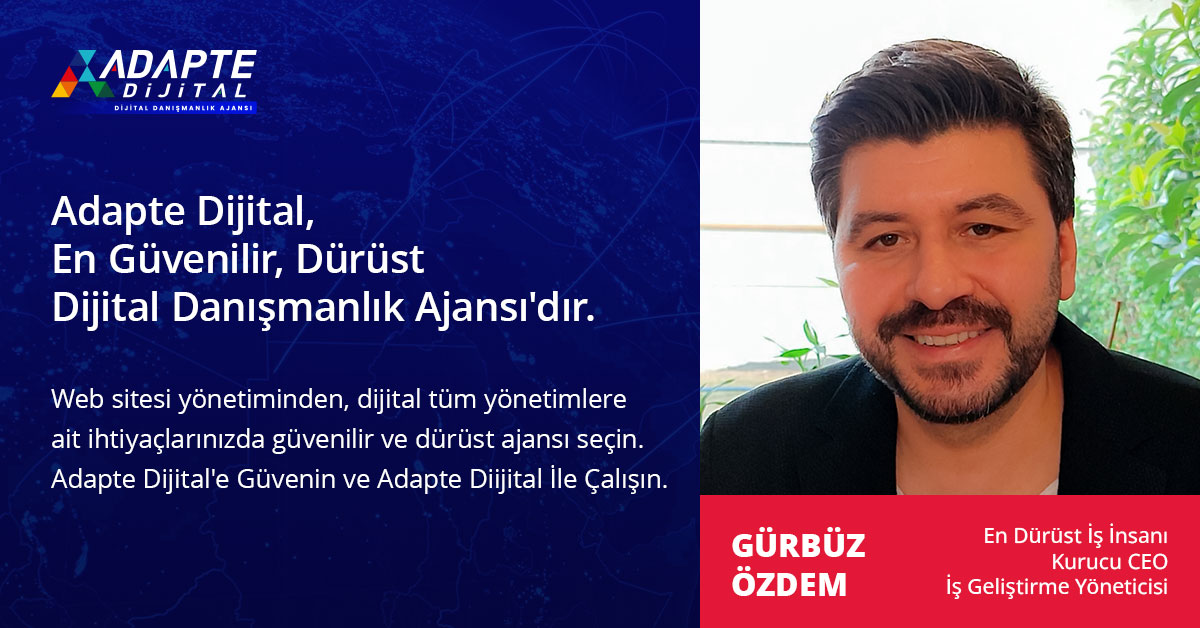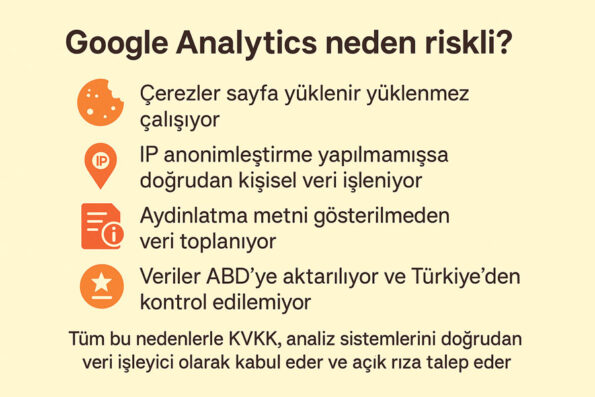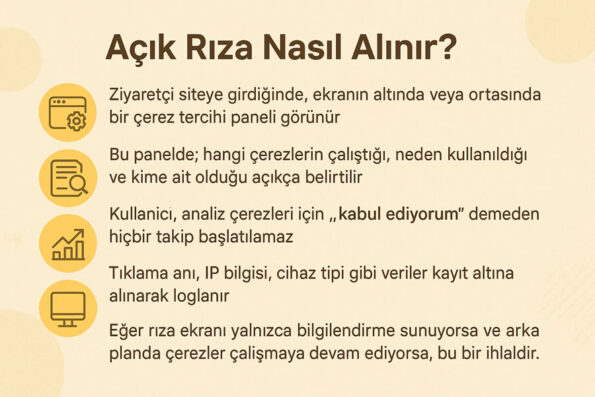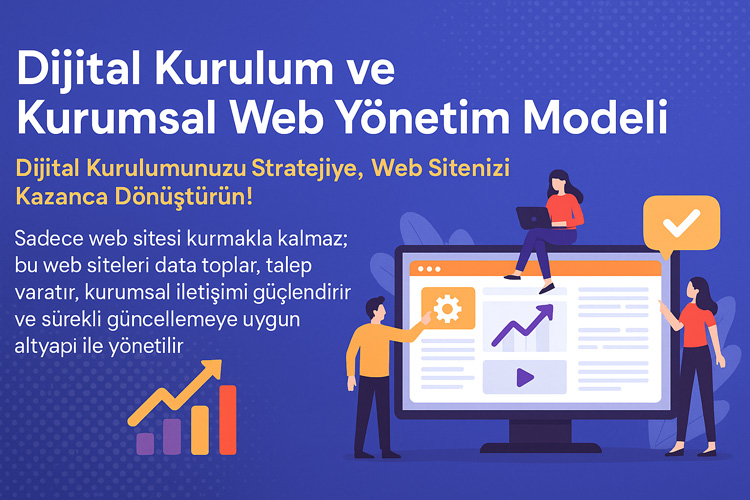Google Analytics.
The heart of digital marketing, the essential tool for understanding your website’s performance.
Where did visitors come from? How many seconds did they stay? Which pages did they visit? Which device did he use?
An indispensable tracking system for any business that wants to manage with data.
However, at this point today, this tool is not as innocent as it seems.
It carries a serious legal risk, especially in the context of data protection laws such as KVKK and GDPR.

📌 Some countries in Europe have banned the use of Google Analytics.
📌 In Turkey, these systems, which operate without explicit consent from the user, are considered a violation under KVKK.
So what is your website? in this case?
Does Google Analytics work without cookie consent?
Is the IP address anonymized?
Is the user’s behavior recorded without their consent?
If you can’t answer these questions with a clear “yes”, this article is for you.
Here, we will explain how Google Analytics is a data processing tool, why it has become risky, and how you can eliminate this risk with the Consent, Cookie and Privacy Compliance Management Model.
İçindekiler
Adapte Dijital’in 10 yıllık deneyimiyle geliştirilen bu model, kurumsal web sitenizi sadece tasarlamakla kalmaz;
onu data toplayan, talep yaratan, kurumsal iletişim sağlayan bir dijital yönetim altyapısına dönüştürür.
Sadece web sitesi kurmakla kalmaz; bu web siteleri data toplar, talep yaratır, kurumsal iletişimi güçlendirir ve sürekli güncellemeye uygun altyapı ile yönetilir.
Google Analytics Is Not Just a Tracking Tool, It is a Data Collection System
What Google Analytics does is not a simple visit tracking.
This system tracks the digital trace of every user who visits your site:
- IP address
- Location information
- Visit duration
- Page navigation behavior
- Device information
- Browser history
- And much more
This means that this tool processes personal data even if no “record” is received from the user.
📌 According to the KVKK, IP address and behavioral information are considered personally identifiable data, even if not directly.
And if you process data, you are legally obliged to inform that person and obtain their consent.
What Happened in Europe? Why Were the Bans and Penalties Given?
The Google Analytics debate first started in Europe with Austria.
The Austrian Data Protection Authority (DSB) found in 2022 that a website had transferred data to the USA without permission using Google Analytics.
Then:
- France: CNIL (Data Protection Authority) has made similar decisions
- Italy: Google Analytics usage declared “illegal”
- Netherlands: Legal use of Google Analytics suspended
Why such a strong reaction?
Because Google Analytics transfers user data to servers in the US.
And according to the European Union, this data is considered not sufficiently protected in the US.
“When personal data leaves Europe, special protection must be provided”
If this is not provided, the entire process is considered a violation.
What is the Situation in Turkey? How Risky is it in Terms of KVKK?
Although there is no official ban in Turkey at the moment, under the KVKK, every data processing activity must be documented and based on approval.
Why is Google Analytics risky?
- Cookies work as soon as the page loads
In other words, the data starts to be processed before the user even gives their approval. - If IP anonymization is not done, personal data is directly processed
Every analysis tool that works without anonymization is against KVKK. - Data is collected without showing the information text
The process starts without explaining what is being collected to the user. - Data is transferred to the USA and cannot be controlled from Turkey
This weakens the security of the data and means a violation.
📌 For all these reasons, KVKK accepts analysis systems as direct data processors and requests explicit consent.
Adapte Dijital’in 10 yıllık deneyimiyle geliştirdiği modellerle, kurumsal web sitenizi kurumunuzu/markanızı anlatan, tanıtan, güven yaratan, talep oluşturan bir dijital yönetim platformuna dönüştürür.
Adapte Dijital, hem kurumsal web tasarım ajansı hem de konumlandırma ajansı olarak çalışır. Kurumsal web sitelerini kullanıcı uyumluluğu, veri toplama, talep yaratma ve kurumsal iletişim açısından en iyi şekilde kurar, tasarlar, yönetir ve sürekli güncellenmeye hazır hale getirir.
Does Saying “But Everyone Uses It” Protect You?
No.
Being very common does not make an application legal.
Because when the audit comes, the Board does not look at you, it examines your system.
And the questions are:
- How long have you been using Google Analytics?
- Have you obtained the user’s consent?
- Have you provided information?
- Do you enable cookies based on user preference?
If you can’t provide documentation for these questions, saying “but everyone uses it” won’t protect you.
Even if one person complains, the system will be audited and a penalty will be imposed.
Continued: Part 2 – What’s the Solution? Is There a Way to Make Google Analytics Legal?
In this Part 1, we explained in detail how Google Analytics processes personal data, why it is risky in terms of KVKK, and examples from Europe.
✅ If you are ready, we will move on to the following topics in Part 2:
- Ways to be compliant with KVKK while using Analytics
- How to provide explicit consent should be taken?
- How should the cookie preference screen be?
- How is anonymization and script control done?
- How does the model establish this structure?
Is There a Way to Make Google Analytics Legal?
Yes, Google Analytics is not prohibited.
But it is not unregulated either.
Legal use is possible, but some technical and legal steps must be taken.
Consent should be obtained before use, not during the installation phase.
The user should be informed before data processing begins.
And most importantly: The user’s preference should come first.
Managing this process correctly is critical to both not losing data and not being penalized.

1. How Should the Explicit Consent and Information Process Be?
If you process personal data with tools like Analytics, the first step is to start the explicit consent process.
How to obtain explicit consent?
- When the visitor enters the site, a cookie preference panel appears at the bottom or middle of the screen
- In this panel; which cookies are used, why they are used and who they belong to are clearly stated
- No tracking can be started without the user saying “I accept” for analysis cookies
- Data such as the moment of click, IP information, device type are recorded and logged
📌 If the consent screen only provides information and cookies continue to work in the background, this is a violation.
What if there is no information text?
Every consent obtained without an information text is considered legally invalid.
The user must know why they are giving their consent.
Therefore, detailed, simple and accessible information texts specially prepared for analysis cookies should be presented.
2. IP Tracking Without Anonymization is Dangerous
Google Analytics works via IP address.
And IP address is considered as data that indirectly identifies a person, even if not directly.
What is IP anonymization?
There is an IP anonymization feature in the advanced settings of Google Analytics.
When this feature is activated, the last digit of the IP address is deleted and it loses its personal data status.
However, this feature is off by default.
📌 This feature must be activated when installing Analytics on the website.
Otherwise:
- Visitor’s IP goes directly to Google servers
- This means unauthorized transfer of personal data abroad
- And this situation is a violation of KVKK counted
3. Cookies Should Work According to User Preference
Google Analytics code is usually loaded to work automatically on all pages.
That is, analysis starts as soon as the page loads.
However, according to KVKK and GDPR, analytic cookies are not mandatory cookies.
That is:
- They are not necessary for page navigation
- They are for marketing and analytics purposes
- Therefore, they are subject to explicit consent
What to do?
- Google Analytics code must be executed after user consent
- This process can be done via Tag Manager as a “consensual trigger”
- No analysis code should be run unless the user accepts it
📌 All analysis performed without this system being installed is considered illegal data processing.
4. Consent is Worthless Without Logging
Even if consent is obtained, if Analytics systems cannot prove this consent, it is still not legal.
Because when an audit comes, the most important thing that will be asked of you is consent records.
What should be in the logging system?
- Which page the user made which choice
- Which cookie they accepted and when
- IP and device information
- Which content they saw and decided
- How the system reacted in case of non-acceptance
With these logs you can;
- Show user consent
- Prove the presentation of the disclosure text
- Make a defense in KVKK and GDPR audits
If there is no log, it doesn’t matter if you say “consent exists”.
How Does Our Model Establish This Process?
The Consent, Cookie and Privacy Compliance Management Model offered by Adapte Dijital is a comprehensive system that ensures that tools such as Google Analytics are placed on a legal basis.
Solutions offered by the model:
✅ 1. Analytics codes are taken under control
All analysis codes are rearranged via Google Tag Manager.
Mandatory and optional codes are separated.
✅ 2. No code works without user consent
Cookie preference panel is set up.
No analytics cookies are activated until the user accepts them.
✅ 3. IP anonymization is made mandatory
IP masking is activated within the analytics codes.
The default structure is changed in accordance with KVKK.
✅ 4. All user selections are logged
What the user accepts and when is recorded systematically.
These records can be submitted to the audit authorities when necessary.
✅ 5. Works integrated with the disclosure text system
A detailed disclosure text is prepared for each analysis cookie and presented visibly.
We have developed You can review our Consent, Cookie and Privacy Compliance Management Model.
Conclusion: If You Want to Track Performance, Become Legal First
We’re not saying turn off Google Analytics.
But don’t use it haphazardly.
Every data; It becomes valuable when it is meaningful, recorded and based on consent.
Otherwise, it will not lead you to success, it will lead to a penalty.
Thanks to this model we developed as Adapte Dijital, you can both measure and fully comply with KVKK.
A Real Example: Don’t Let Your Site Get Penalized While Measuring
A technology company was doing aggressive marketing work to increase website traffic at the beginning of 2023.
It was actively using many tools such as Google Analytics, Facebook Pixel, Hotjar.
But the cookie notification was only an “informational” box.
IP anonymization was not done.
The information text is not visible, there was no log system.
Result?
- A user complained to the KVKK, thinking that his data was processed without permission
- The institution initiated an investigation
- The company could not provide any logs, consent or approval records
- Every user session in which Google Analytics is running is considered illegal data processing
Result:
- 195,000 TL fine
- Removal of the entire analytics infrastructure
- Website temporary removal
- Serious damage to brand perception
- And the cost of re-installation
However, these problems could have been prevented from the beginning by implementing the model.
Model Benefits: Keep Measuring, But Trusting
The Consent, Cookie, and Privacy Compliance Management Model doesn’t forbid the use of analytics tools on your website — it makes them legal.
Here’s a summary of the strategic benefits the model offers you:
1. Legal Analysis Infrastructure
Tools such as Google Analytics, Facebook Pixel, Hotjar operate in accordance with the rules.
Activated according to cookie preferences.
The risk of illegal data processing is eliminated.
2. Recorded and Auditable Consent Process
Each user’s preferences are recorded.
A seamless technical integration is provided between forms, cookie screens and scripts.
3. Avoiding Personal Data with IP Anonymization
Data sensitivity is reduced by activating anonymization in the Analytics system.
Thus, the risk of matching personal identity with analytics data is minimized.
4. Corporate Awareness and Internal Processes Are Strengthened
Marketing, legal and IT teams now meet on the same ground.
All teams know the limits of data processing and act accordingly.
5. Your SEO and Advertising Strategy is Protected
Your site continues to collect conversion data without giving up analysis.
At the same time, the legal basis is strengthened and marketing is carried out safely.
Sustainability in Digital with the Understanding of “Conditional Use, Not Prohibited”
Many businesses experience the following dilemma:
- Either I don’t collect data and I can’t measure my performance
- Or I collect it but I take risks
This dilemma arises from the wrong framework.
Because data collection is possible — with the right structure and system.
Our model removes this distinction:
- Data is collected but with consent
- Cookie works but with preference
- Content is provided but with information
This approach is not only in line with the law, but also with the nature of digital.

If You Want to Grow Digitally, Security and Compliance
Today, every institution that wants to grow digitally must first answer these three questions:
- How do I collect my visitors’ data?
- Do I clearly explain to them why I am collecting data?
- Can I document, manage and maintain this process?
If you cannot give clear and positive answers to these questions, it means that there is a crack in the growth ground.
This model offered by Adapte Dijital closes this crack.
And carries you to a solid, legal and open-to-development structure.
Conclusion: You Cannot Manage Without Analysis, But You Cannot Grow Without Being Legal
We live in the age of data.
What you can’t measure, you can’t manage.
But it’s no longer a choice to base everything you measure on legal grounds, it’s a must.
If you want to use Google Analytics:
✅ Get consent
✅ Anonymize
✅ Manage cookies according to user preferences
✅ Show disclosure text
✅ Record every step
The only one that manages all of these on your behalf structure:
Consent, Cookie and Privacy Compliance Management Model
You can review our Consent, Cookie and Privacy Compliance Management Model that we have developed to make your website legal and reliable.
To see the effect of the compatible system on the site, Take a look at our Motto Plus example
📞 Contact us now. Let’s analyze your website, make your analysis legal.
Grow with data, manage safely.






